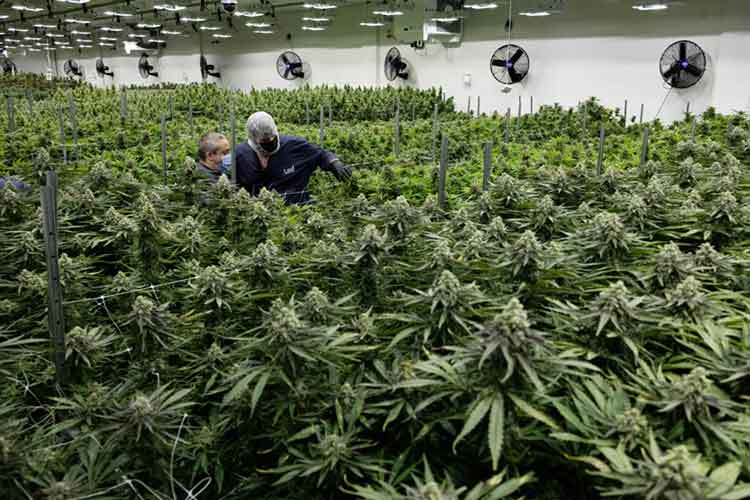Understanding the Cannabinoid THCA
What is THCA?
THCA, or tetrahydrocannabinolic acid, is the acidic form of THC. As a cannabis plant matures and its buds grow, its terpene and cannabinoid content begin to develop. The first cannabinoid the plant produces is CBGA, known as the “mother of all cannabinoids” because it eventually breaks down to create primary cannabinoids like THCA and CBDA.
THCA itself is not intoxicating when ingested. This is because it has an additional molecular carboxyl ring, which prevents it from binding to brain receptors that cause the feeling of being high.
You might wonder, “What’s the point if it doesn’t get me stoned?” But without THCA, we wouldn’t have THC or its many health benefits. When THCA is exposed to heat, like when smoking, vaping, dabbing, or cooking, it converts into THC, the cannabinoid responsible for the high

THCA vs THC
Imagine a world where cannabis plants are alchemists, and their secret potion is THCA, or tetrahydrocannabinolic acid. This magical compound is like the shy cousin of THC. As the cannabis plant grows and its buds bloom, it starts producing a bunch of different chemicals, including CBGA, the “mother of all cannabinoids.” CBGA is like the grandmaster chemist that eventually creates the stars of the show, THCA and CBDA.
THCA, in its pure form, is like a potion without the buzz. It won’t get you high because it has this special molecular shield—a carboxyl ring—that stops it from hooking up with your brain’s high-inducing receptors.
Now, you might be scratching your head and thinking, “What’s the big deal if it doesn’t make me feel anything?” Well, THCA is the crucial ingredient for the star of the show, THC. When you light up, vape, dab, or cook your cannabis, the heat acts like a magical catalyst, transforming THCA into the exhilarating THC. So, while THCA might seem like the quiet background character, it’s actually the unsung hero that makes the THC magic possible
Is a higher-level THA or THCA better?
You might think aiming for a high THC number is the way to go, but there’s a catch. Directly applying heat to THC can burn off some of the precious cannabinoids, leaving you unsatisfied. Instead, you should look for high THCA numbers, not just THC. That THCA is like a hidden treasure chest of potency waiting to be unlocked when you smoke, dab, or vape.
So, if you’re after flower, vape cartridges, or concentrates, always check the THCA levels. These products need decarboxylation—activation by heat—to release their full potential and give you that sought-after high.
Is THCA the same as Delta-9 or Delta-8?
Meet THCA, the precursor to delta-9 THC, the star player in cannabis that gets everyone talking. THCA is like the shy, unassuming cousin that doesn’t make you feel high until it’s heated up and transformed.
Then there’s delta-8 THC, the quirky sibling of delta-9. It’s got the same number of atoms but with a different arrangement, giving it a unique twist. This quirky nature has allowed companies to create delta-8 products from hemp, legally, as long as they contain less than 0.3% delta-9 THC.
Delta-8 also comes from THCA, known in this case as delta-8-tetrahydrocannabinolic acid. However, there’s still much to learn about how delta-8 measures up against its cousin THCA.
Both delta-8 and delta-9 THC can get you high, but they aren’t acidic like THCA. So, while THCA stays low-key until it’s heated, delta-8 and delta-9 are ready to party right from the start
What are THCA’s benefits and effects?
There’s not enough data to confirm whether THCA provides pain relief in the same way THC does, but it does interact with our receptors in a more indirect way. Research has shown that THCA might have neuroprotective properties, which could help slow down or prevent neurodegenerative diseases like Huntington’s. It may also be beneficial for conditions like colitis and IBS, and early findings suggest it could assist with seizure disorders.
How do you use THCA?
Many cannabis enthusiasts and patients convert THCA into THC daily through smoking, dabbing, vaping, or consuming edibles to get high or manage symptoms. In these cases, THCA acts as a gateway to the benefits of THC. However, more and more brands are recognizing the unique benefits of THCA on its own.
One popular and easy way to use THCA is by consuming raw cannabis. You can eat it directly, but many people prefer adding it to their juicing routine for better taste and effectiveness. Additionally, many companies now offer THCA tinctures and topicals, which can be used like vitamins or as a soothing massage product after intense activity.
How to activate THCA
But wait, there’s more! You can also decarboxylate cannabis for making edibles, tinctures, and topicals. The trick is to expose your cannabis flower to temperatures around 200-245ºF for 30-40 minutes in a conventional oven. Be careful, though—going over 300º or cooking it for too long will burn away those precious cannabinoids.
Should you dab or smoke THCA?
The moment THCA feels that warmth, it starts transforming into THC. So, whether you’re sparking up a joint, packing a bowl, hitting a bong, or pulling from a THCA Vape Cart, clicking your vaporizer—whatever your style, you’re mostly inhaling THC once that heat kicks in.
Does THCA show up on a drug test?
Even though THCA isn’t classified as a controlled substance, possessing an illegal amount of THCA-rich products like cannabis or concentrates can still get you in trouble under both local and federal laws. So, if you get caught with a pound of weed, law enforcement won’t care that raw cannabis doesn’t make you high on its own.
Is THCA legal?
Even though THCA isn’t classified as a controlled substance, possessing an illegal amount of THCA-rich products like cannabis or concentrates can still get you in trouble under both local and federal laws. So, if you get caught with a pound of weed, law enforcement won’t care that raw cannabis doesn’t make you high on its own.


